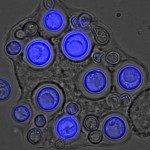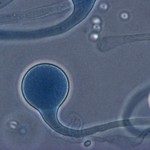Lien vers Pubmed [PMID] – 27494830
Lien DOI – 10.1093/jac/dkw036
J. Antimicrob. Chemother. 2016 08; 71(8): 2075-8
Given reports showing a high prevalence of azole resistance in Aspergillus fumigatus, alternatives to azole therapy are discussed when a threshold of 10% of azole-resistant environmental isolates is reached. This raises the issue of calculation of this threshold, either on the prevalence of azole-resistant isolates as a whole or on the prevalence of azole-resistant cases in populations at risk of invasive aspergillosis (IA). For isolate evaluation, there are high disparities in routine microbiological procedures for the isolation of A. fumigatus and azole resistance detection. There are also huge differences between the microbiological work-up for diagnosing IA. Some centres rely on galactomannan detection alone without actively trying to culture appropriate samples, which affects reliability of the figures on the prevalence of resistance and thus the threshold of resistance. Moreover, reports from the laboratory could mix up figures from completely different patient populations: frequent azole-resistant isolates from pneumology patients and rare azole-resistant isolates from haematology patients. Therefore, to sum isolates from different specimens and different wards can lead to erroneous calculations for the restricted populations at risk of developing IA. In conclusion, assessing the incidence of azole resistance in A. fumigatus should be based on harmonized consensual microbiological methods and reports should be restricted to IA episodes in identified populations at risk of IA when the issue is to define an operational threshold for modifying recommendations.



